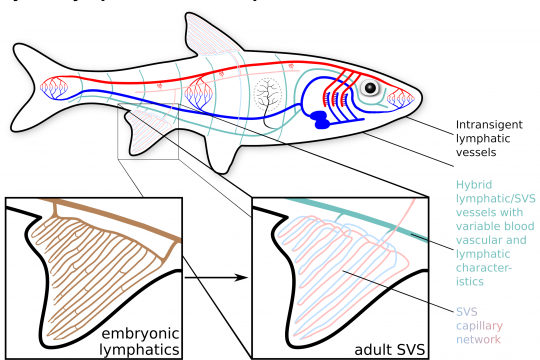Do fish have lymphatics?

Read the whole back story in our preprint: https://doi.org/10.20944/preprints202312.2119.v1. It isn't easy to believe that the scientific community cannot agree on whether zebrafish have a lymphatic vascular system. Zebrafish is one of the most successful model organisms in biology, and one would assume that we know its overall vascular setup. However, starting with W. Vogel in 1981 (https://doi.org/10.1515/znc-1981-5-627), many fish physiologists subscribe to the notion that there are no lymphatics in fish, and most contemporary fish physiology textbooks have appropriated this point of view. At the same time, solid publications from multiple labs show that lymphatic vessels exist in fish (https://doi.org/10.1038/nm1427, https://doi.org/10.1016/j.cub.2006.05.026). What is going on? When the Yaniv lab published in 2022 that embryonic lymphatics in zebrafish can transdifferentiate into blood vessels (https://doi.org/10.1038/s41586-022-04766-2), it suddenly appeared possible to unite the two contradictory views. In a nutshell: In most fish, an embryonic lymphatic system transdifferentiates during development into blood vessels that form a specialized subcompartment of the cardiovascular system (the so-called secondary vascular system). The degree of transdifferentiation seems quite variable between fish species, and some vessels - notably the thoracic duct - might retain a hybrid phenotype.
As so often is the case in top journals, the original article by Das et al. neither discussed the 100-year-old controversy nor the ramifications of its landmark findings. Even though Kari Alitalo and I did so in a short commentary (https://rdcu.be/cOjJ0), more space is needed to do justice to the topic. Although the controversy about piscine lymphatics is far from settled, it appears important to record the current status of the discussion in the scientific literature. Moreover, we wanted to describe a high-likelihood consensus model against which to plan future experiments. The result is an extended review; we hope you'll enjoy reading it. If you find something that you don't like, by all means, let us know! Especially if you can back up your critique with data or sound arguments. We sent the manuscript for review and are happy to improve it based on your input.



